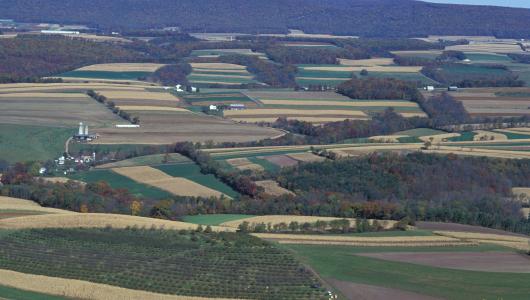From the kitchen table to the boardroom table, USDA brings people together across the nation for: healthier food, natural resources and people; a stronger agricultural industry; and economic growth, jobs and innovation.
Each Friday, meet those farmers, producers and landowners through our #FridaysOnTheFarm stories. Visit local farms, ranches, forests and resource areas where USDA customers and partners do right and feed everyone.
This Friday, meet the Brady family, who run Shaggy Coos Farm in Easton, Connecticut. Tim and Bernadette Brady, along with their daughters, Matilda and Margaret, produce and sell beef, pork, poultry and dairy products.
Read the interactive, multimedia version of this Fridays on the Farm story.
Bit by Bit
Shaggy Coos Farm is named for the Scottish Highland cattle the Bradys began raising in 2007.
Since then, they have added chickens, pigs, turkeys and ducks to their Connecticut farm over the last 10 years. “We’ve added a bit more each year,” Tim said.
Most recently, they have added dairy cattle to their operation.
Passion for Ag
The farm is truly a family operation. Having a passion for agriculture, daughters Matilda and Margaret have participated in FFA and 4-H projects.
While Matilda, now a senior at West Point, raised and sold pigs for her projects, Margaret, 16, started out growing turkeys in sixth grade and has since moved on to raising and showing dairy cattle.
Her first dairy project was a leased Jersey calf from a dairy farmer friend, who named her “Dream On” after the song by Aerosmith.
In fact, dairy was introduced into their operation through Margaret’s projects.
“Margaret was really excited about dairy,” said Tim. “We knew we needed to get Holsteins.”
The Bradys purchased two Holstein cows, Madison and Ivory, and began milking them twice a day.
Both Matilda and Margaret have participated in the USDA Farm Service Agency’s (FSA) youth loan program to help finance their projects.
FSA’s youth loans help youth start and operate income-producing projects of modest size, providing the opportunity to gain experience and education in agriculture.
“The youth loan program has taught me about budgeting money. It’s helped me learn the different aspects, financially, of how to run a business successfully,” Margaret said.
The Next Challenge
With cows producing milk, the Bradys had to add infrastructure to their farm to store and pasteurize the milk. A microloan through FSA’s Farm Storage Facility Loan Program (FSFL) became their solution, as the program provides low-interest financing so producers can build or upgrade facilities to store commodities.
With the FSFL microloan, Shaggy Coos Farm added a bulk tank to store their milk for pasteurization. They pasteurize and bottle their milk, selling whole milk and chocolate milk out of their farm store and in local retail stores around the community.
“When I met Tim, he had just one cow and a dream,” said Aimee Fusco, FSA county executive director. “I was happy to work with his family and make the dream become a reality. It was so rewarding to see a bottle of chocolate milk with their logo on it.”
Aside from milk, they sell their pork, beef and poultry products in the farm store, along with soaps and lotions they make from milk. Their farm fresh yogurt will soon be on the menu.
Leading Forward
The farm now has five dairy cows that Margaret works with daily, from pasturing them to pasteurizing their milk.
“For a kid who doesn’t even have a driver’s license yet, it’s amazing what she can get done at such a young age,” Tim said.
Margaret will start her junior year at Trumbull High School in the fall, where she participates in the Agriscience and Biotechnology program. She was elected vice president of her FFA chapter for the 2018-19 school year.
After graduating from high school, she plans to earn a degree in agribusiness or agriculture education to become a dairy farmer or teacher.
“Nothing’s ever handed out,” she said. “You have to be ready to work for what you want.”
More Information
USDA offers a variety of risk management, disaster assistance, loan, and conservation programs to help agricultural producers in the United States weather ups and downs in the market and natural disasters as well as invest in improvements to their operations. Learn about additional programs.
For more information about USDA programs and services, contact your local USDA service center.
Join the Conversation
Follow the Fridays on the Farm story series and other news you can use on farmers.gov and @Farmersgov on Twitter.
Story Credits: Lauren Moore, FSA
Photo Credits: Shaggy Coos Farm


